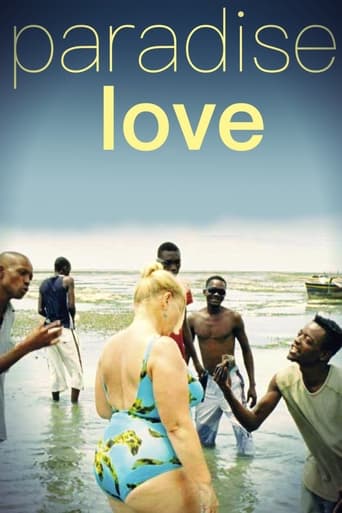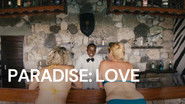Andres-Camara
Otherwise, I get in the first few minutes of the movie and I get over thirty minutes at least. It is repetitive until satiety. Extend the scenes to excess. To the extreme of getting bored a lot. Everyone knows what this tourism is about, it has not told us anything new, but it also makes it boring. It does not manage to convey grief at any moment, and it looks that the situations would have to give it.The only good thing he has, is that the actors, all, seem to be living their lives really, but is that even so the director, it bores you.He has a horrible picture. He has a white light constantly when he is counting something sad, I do not know why it should be so.The address, I do not know if it exists, I would say no. If it exists, why do not you know it's too long? I think that someone put the camera in general plane and so rolled everything and also sometimes badly composed.You will say that you talk a lot about a social issue in Northern Europe and Africa, but I think that talking about it could make it more enjoyable, which does not mean that you leave the cinema happy.
chaos-rampant
We enter here a paradisaical world with this woman, a middle-aged Austrian who's gone to Kenya on vacation. We enter as she does, strangers, fascinated. There is no transition to this new world, no waiting on airports, no planning for the journey, we are immediately swept as if by the urge to be there. Once there we see as she does, stylized images, arranged symmetries. In the hotel resort there are trivial games, senile safety, control: the Africans are confections to be toyed with and enjoyed, ranges for the eye to roam. The question that looms is is she there for the encounter and surprise or merely looking for images to bring home to a dull life? You'll see this early in the metaphor with the monkey that takes her bait but refuses to be photographed, eluding her. More importantly: are we here on cinematic vacation or to come to an understanding? Out in the streets there is a more palpable tension however; all about baring yourself to be seen and the quest for meaning. I like the subject, the lush Africa, the sexual frankness, the fact that sex and meaning are sublimated in a viewing space between people.So I believe this could have been tremendously powerful stuff in the right hands. Alas the filmmaker is Austrian and this means that we see in the same stark light they bring to everything they do: from logic to politics to music. What does this mean, a stark light ? It means every encounter has to be sooner rather than later exposed as meaningless, because the ultimate point here is some void at heart, the same that originally creates the journey there, which is also the filmmaker's. It means that he can't let go, and not allowing himself to yet know, coast on the tension of an encounter that may be false, that most probably is false, yet like movies and love work in life, that we can throw ourselves in it as if it is real and in doing so imbue it with truth, weave it from air. A Mood for Love with a question behind each glance. I'm dreaming of the film Cassavetes would do: all about building to this more or less certain horizon of betrayal with momentary truths, small moments like passing a joint in the dark, riding this tension, hiding the logical knowledge. So I lament this because his failure is the same as his heroine's failure to find fulfillment. He resorts to more obvious stuff, merely chronicling the lack: disillusionment, loneliness and how that gives rise to dehumanizing spectacle as in the scene where the woman is offered in her hotel room a witless African to tease and fondle. Ordinary.You can even see this reluctance in his camera when now and then he lets it wander: we don't deeply feel the textures, we are never truly enmeshed in the world. Again this is as much cinematic translation of the woman's pov as it is inescapable worldview for the filmmaker, the same boxed worldview that Herzog runs from by journeying to the edges to throw himself on the manifold strangeness of things, letting his eye roam, staging boats tugged over hills so it can become real.
m.a. moore
This is a super film in many respects. Beautifully filmed. Interesting issues. And sensitive approach.But some of the sex scenes were exploitative of the actors, particularly the first and last sex scene (the rest were fine and gave a real sense of what was going on).I thought that it was a terrible irony that the director was making a point about sexual exploitation, when he was in effect sexually exploiting these actors, very tawdry and morally questionable.Otherwise, I would have given the film an 8 or 9. And was tempted to give it a 1 because of this.
octopusluke
Two days after watching Michael Haneke's staggering Amour, I checked in with Austria's other tyrannous filmmaker Ulrich Seidl and his latest movie Paradise: Love (or, Paradies Liebe, in Austrian-German). Nominated for the Palme D'or at this year's Cannes Film Festival (where it actually lost out to Amour), it's the first part of a trilogy looking at the despicable sides of human nature (the following two parts will be screened at festivals in 2013).Just like his other previous works in documentary (Jesus, You Know) and fiction (Dog Days), Love is an infuriating film; whereby we have no idea where the story is going, and seemingly Seidl doesn't have a clue either. Shot in his trademark static mid shots, with copious amounts of skin on show, it's paradoxically beautiful and grotesque. Like a Lucian Freud painting with just as much of his grandfather's' psychoanalytical subtext, to boot.Margarete Tiesel plays Teresa, a middle aged single parent living in drab suburban Vienna. The first scene sees her smiling from a distance as she watches a class of disabled children fumble-play on a bumper car track. It's a harrowing, typically nasty opening, and really sets the film off in mean spirited territory, with Seidl doing his token unflinching exploitation gimmick.From here, Teresa decides to leave her daughter behind at fat camp and flee to Kenya for a paradisiac holiday. Meeting up with her Austrian expat friend (Inge Maux), the pair talk in typically colonialist terms about African culture and black men's genitalia. Later, on her own, she's constantly harangued by the pushy salesmen on the beachfront, trying to sell her homemade necklaces and pearls at tourist prices. Although she's reluctant to purchase their crap, she willingly buys into the perilous sex tourism trade, first as a customer, and later as one of it's scammed victims. Bleak in tone, yet idyllically colourful in palette, the proceeding 90 minutes follows a series of degradations Teresa must go through in her troubled pursuit for paradise.Similarly to his other work, flesh and body politics play a central role to the narrative, character dynamics and control of the movie. Wandering around in flip flops and skimpy bathing suits, Teresa's slightly rotund exterior is used to exaggerate the character's wealth, decadence and presumed dominance over the comparatively slight, underfed and suffering Kenyans. It's a sentiment made painfully clear in one scene where Teresa partakes in an orgy of sorts where three other overweight German/Austrian women force a lean black Kenyan man to perform for their pleasure, and much to his embarrassment.Whilst this may be the most palatable of Seidl's fiction films, it's certainly not an easy watch. At an excessive two hours, he wallows for too long in the audiences' discomfort without ever given us a worthwhile pay-off. Whilst the landscape is filmed beautifully by regular cinematographer Wolfgang Thaler, this bastardised version of Shirley Valentine is a pretty loveless film experience.More reviews at www.366movies.com




